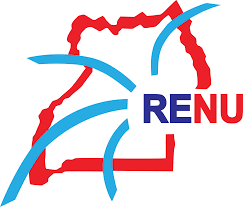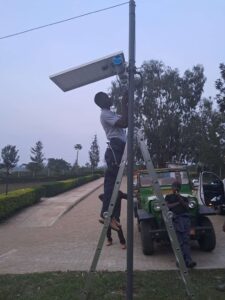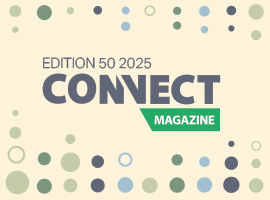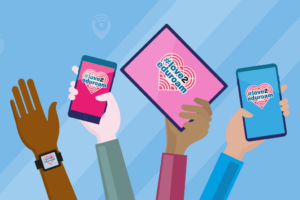In 2023, Uganda had 27.7 million active Internet subscriptions with the typical user consuming only 1.7 GB of mobile data per month, barely enough to stream a single two-hour lecture. The Internet Poverty Index helps explain this disconnect. It classifies almost three-quarters of Ugandans as “Internet-poor,” meaning they cannot afford the minimum 1 GB at 10 Mbps that the index uses to gauge basic digital opportunity.
This triple effect of affordability, data caps and slow speeds leaves millions of students and researchers offline as soon as they step off campus. Metro eduroam tackles all the three bottlenecks at once; it delivers free, unlimited, high-speed, institution-grade Wi-Fi, at hostels, cafés and other public spaces.
 Metro eduroam is an extension of on-campus eduroam, a global roaming WiFi that allows users to connect securely to the Internet using their institutional credentials at any eduroam-enabled location worldwide. Responding to the urgent need for remote Internet access during the COVID-19 pandemic, RENU introduced Metro eduroam in Uganda, initially at 300 locations within the Kampala Metropolitan, extending access to hostels, libraries, cafés, and other public places. The hotspots were set up using existing infrastructure from commercial providers.
Metro eduroam is an extension of on-campus eduroam, a global roaming WiFi that allows users to connect securely to the Internet using their institutional credentials at any eduroam-enabled location worldwide. Responding to the urgent need for remote Internet access during the COVID-19 pandemic, RENU introduced Metro eduroam in Uganda, initially at 300 locations within the Kampala Metropolitan, extending access to hostels, libraries, cafés, and other public places. The hotspots were set up using existing infrastructure from commercial providers.
In May 2022, RENU expanded Metro eduroam to 18 more towns with support from the Internet Society Foundation’s BOLT (Building Opportunities/Leveraging Technologies) program. However, implementation became very costly, was prone to frequent power outages, and lacked adequate service monitoring and support.
To overcome the challenges, RENU, using solar-powered access points expanded its eduroam access to 600 locations, 150 of them solar-powered. This was achieved with a second grant from the Internet Society Foundation’s BOLT program.
Being the first solar-powered routers produced in Uganda, they offer a more affordable and stable connectivity option for homes and businesses, eliminating the need for cabling, reliance on electricity, and recurring power costs.
Following this expansion, Internet capacity demand has surged from 100 Mbps in 2022 to 1 Gbps in April 2025. The number of institutions joining eduroam has increased from 20 in December 2020 to 256 in April 2025, driven by the desire to access Metro eduroam service. Additionally, successful logins have surged over the years, with the most significant occurring in 2024, attributed to wider deployment of RENU-owned solar-powered routers across the country.
According to Mr. Jones Murangira, the ICT Head at Kabale University in South-Western Uganda, over 1,500 students are actively using eduroam, with login success rates steadily improving thanks to continuous training and support. Upon admission, staff and students receive institutional email accounts, along orientation sessions to ensure a smooth onboarding process.
Mr. Murangira notes, “The university now benefits from eight solar-powered Metro eduroam hotspots close to hostels and staff housing. This has ensured consistent off-campus connectivity, supporting learning and work outside conventional classrooms and offices.”
Mr. Abaho Naboth, a Network Engineer at Mountains of the Moon University in Western Uganda, shares a similar experience: “Previously, staff primarily depended on mobile data for online teaching, which was not sustainable. As a result, many avoided it. The introduction of Metro eduroam significantly improved participation. By the end of June 2024, 500+ students had connected to eduroam.”
Below, we bring detail on how Metro eduroam is impacting member institutions and the lives of students.
Enhancing online learning and reducing data costs

Bronia Isaac Akankwasa, a student at Kabale University, explained that before Metro eduroam, he spent about UGX 2,000 daily on mobile data. Now, his daily data expenses have dropped to UGX 500. He utilises eduroam to access essential platforms such as My Student, e-learning systems, and research resources.
Mariam Namirembe, from Kabale University, highlights a travel scenario. “I once travelled to Mbarara University to visit a friend, and I had an online class scheduled. I didn’t have any data bundles but amazingly, my phone automatically connected to eduroam while in Mbarara, and I seamlessly attended the class.”
Empowering research and academic performance
Mr. Jones Murangira, Head of ICT at Kabale University, reported increased research activity, citing a rise in submissions to the Institutional Digital Repository (IDR). He attributes this improvement partly to increased access from the eduroam hotspots. Kabale University now ranks 3rd nationally on the AD Scientific Index, a milestone greatly driven by enhanced connectivity.
Many students testified that without Metro eduroam, their expenses would be unmanageable. Joslyn Asaba, a first-year student of Bachelor of Science in Biotechnology at Kabale University appreciates eduroam; “What I value most about eduroam is it’s free and reliable, allowing me stay online without spending.”
Adoption of eduroam as the sole SSID
Some of RENU member institutions have further to adopt eduroam as the only Wi-Fi network (SSID) on their campuses, a reflection of deep trust in the solution.
Heritage International School’s transition to eduroam was driven by a need for a secure, single sign-on network solution that wouldn’t compromise user experience. After rigorous exploration and consultations with RENU, the school implemented eduroam as its only SSID, enhancing network control and seamless secure connectivity on- and off-campus, an important prerequisite for remote learning and teaching.
Lira University also adopted eduroam exclusively following a Direct Engineering Assistance (DEA) by RENU in 2019. Students and staff now have seamless educational mobility through a single set of credentials.
At Uganda Christian University (UCU), eduroam is the sole SSID across its 5 campuses. As one of eduroam’s early adopters, UCU understands the power of eduroam in enabling academic growth and innovation. Today, UCU relies on eduroam, Metro eduroam, and eduroam on the Go devices to ensure students and staff have secure access wherever they are.
Through innovations such as solar-powered routers, the eduroam SpoT App, eduroam on the Go, and the anticipated eSIM integration, RENU is narrowing the digital divide and building a robust and future-ready academic and research network for Uganda and the broader region.

Read the full online magazine here






